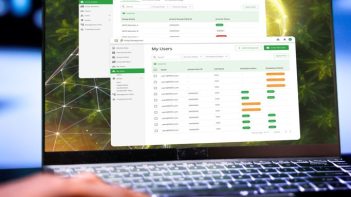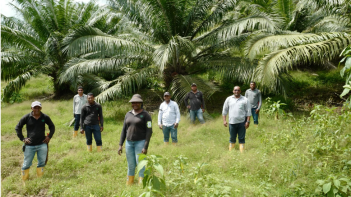Great challenges come with even greater opportunities. This is how Edem Asimadu, who joins RSPO as Smallholder Manager (Africa), sees her new role at an auspicious moment for the oil palm industry in the African region. Hailing from Ghana, Edem highlights the main differences between the palm oil industry in Africa compared to other producing regions, in that oil palm is largely consumed locally and thus the push for sustainability does not come uniquely from the international market. “Being in an emerging space offers us the opportunity to get things right from the get go and ensure that sustainability is fully integrated in everything we do,” she shares. “Yet there isn’t going to be a one size fits all solution or quick action approach to sustainability — there is a need to take in the context and understand it, and use that to define and adopt the approaches towards sustainability.”
Edem’s interest in development and transformative agriculture can be traced back to her experience after graduating from university and working at the Food and Agriculture Organization (FAO), where she first got a sense of the significant issues on the African continent and the interventions needed to address them. She obtained a Master’s Degree in Development Studies at the University of Cambridge, and thereafter started researching for a London-based baobab company working with smallholders in northern Ghana. She also led the implementation of a sustainability project funded by USAID for the shea industry, across eight producing countries in West Africa.
What attracted you to work for RSPO and help achieve its mission?
I first heard about RSPO because the organisation I worked for, the Global Shea Alliance, is modelled along RSPO lines. Whenever we had to do some benchmarking, RSPO was one of the organisations we looked into. I was interested in RSPO because it was fundamentally established to address some of the challenges of palm oil, and to mainstream sustainable palm oil.
Being Ghanaian, oil palm is not new to me, it’s very common, it’s used in a lot of delicacies. Even fresh fruit bunches are consumed here in different kinds of dishes. So reading about the challenges and the issues around oil palm was surprising.
There is an adage, “don’t throw the baby out with the bathwater” — that is how I interpret RSPO’s work, because it acknowledges the challenges and issues, and offers measures to address them, to make the industry more sustainable for the environment and safer for everyone.
What for you are the most significant challenges of oil palm smallholders in the African region?
One of the biggest issues when it comes to the African region and specifically for smallholders is the very nature of the industry. Africa is different in that a huge part of the palm oil produced is consumed locally, so there’s already a huge market for palm oil on the continent. The push for sustainability is not really from the international market; we’re not experiencing the same international pressure or consumer pressure for sustainability as we’ve seen in other regions.
Secondly, in Africa there are artisanal mills that process and generate Crude Palm Oil, CPO from the FFB, which is then largely consumed locally. This is different from other regions which are more export-driven. That is a huge difference which could be a challenge, but I see it as a way to inform our opportunities and interventions.
What are your main priorities in your new role?
I really want to prioritise contextualising the work we are doing in Africa, especially in relation to smallholders. We’re taking the RSPO Smallholder Strategy and developing one focused on Africa, bringing the defined objectives down to the African context and creating specific approaches and strategies for implementation.
Then I’d like to take that a step further — Africa is a whole continent with 22 producing countries, so we want to take that Africa Smallholder Strategy and bring it down further to develop national implementation plans through strong collaboration with national partners, recognising that there are national stakeholders that understand the context, and engage the smallholders themselves. It’s very important that our plans and strategies understand how smallholders also interpret these.
I would like to close the gap between RSPO as an organisation and the smallholder farmer. Success for me would be smallholders fully understanding what sustainability entails, moving away from being an abstract concept into something that’s very practical, and even being in a position to propagate the benefits of sustainability.
In your experience working on the ground close to smallholders, what would you say are their biggest concerns when it comes to certification or sustainability initiatives?
For smallholders, sustainability or certification is not the foremost thing on their minds, it is yield and livelihood improvement. The positive thing is the fact that sustainability is directly linked to yield improvement.
Yield improvement is also linked to livelihood enhancement because their incomes are higher. The first objective in the RSPO Strategy is livelihood improvement for smallholders, ensuring it introduces sustainability practises which have a direct impact on output and livelihoods. That’s the idea, to engage smallholders to let them know and understand the benefits that come to them directly.
Ahead of International Women’s Day, we’d like to get your perspective on the particular challenges that female smallholders in many African countries face, and how we can support them.
One of the things I’d like to do is ensure that whatever strategies we come up with also integrate RSPO’s Gender Policy, which already has a number of strong points for supporting women within the palm sector. The challenges faced by women and men are very unique. Land issues, for example — in a number of producing communities, women cannot own land. These are issues that tend to affect how much income women are able to make from oil palm. Then there is the issue of leadership. Women need to actively participate, so it’s not seen as a men led or male-dominated space.
We are making sure that we have a very clear gender lens in implementing these strategies we are proposing — how would women be able to implement them? How well would women within this context be able to adopt certain sustainability practises? Will they be able to participate in certification efforts? These are some of the questions we are considering.
Looking forward, what would you say are the opportunities to be leveraged in the African region given its unique position as an emerging palm oil market?
It’s like it's coming full circle. Oil palm is indigenous to West Africa, but now, West Africa is a net importer of oil palm. We are keen to go back to a point where we could also become one of the major players in oil palm across the world, but it is important to think about it in a sustainable way. Right from the get go, we need to get sustainability in there; we need to have discussions about sustainable production and ensure that the challenges we’ve seen elsewhere are not replicated in Africa.
Keep reading

Access into prisma

Updated Trace Function in prisma

Call for Expression of Interest: Independent Investigation of a Complaint

Latin American Smallholders, Key Global Brands Gather in Peruvian Amazon to Advance Sustainable Palm Oil

RSPO Forum for Members and Certification Bodies 2025: Strengthening Capacities and Building Bridges with RSPO Members

From Violence to Prosperity: Cultivating Sustainable Palm Oil in San Pablo, Colombia

Palmas de Tumaco: Enduring, Trusting, and Transforming in Colombia’s Pacific Coast
Carry Over Credits for Certified Independent Smallholder Groups




